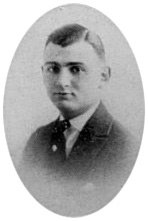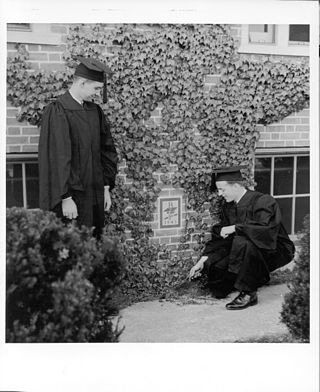Related Research Articles

Dartmouth College is a private Ivy League research university in Hanover, New Hampshire. Established in 1769 by Eleazar Wheelock, it is one of the nine colonial colleges chartered before the American Revolution. Although founded to educate Native Americans in Christian theology and the English way of life, the university primarily trained Congregationalist ministers during its early history before it gradually secularized. It emerged from relative obscurity into national prominence at the turn of the 20th century, and was considered to be the most prestigious undergraduate college in the United States in the early 1900s. While Dartmouth is now a research university rather than simply an undergraduate college, it continues to go by "Dartmouth College" to emphasize its focus on undergraduate education.
Bishop College was a historically black college, founded in Marshall, Texas, United States, in 1881 by the Baptist Home Mission Society. It was intended to serve students in east Texas, where the majority of the black population lived at the time. In 1961 the administration moved the college into Dallas, Texas. It closed in 1988.

The Amos Tuck School of Business Administration is the graduate business school of Dartmouth College, a private research university in Hanover, New Hampshire. The school only offers a Master of Business Administration degree program.
A fight song is a rousing short song associated with a sports team. The term is most common in the United States and Canada. In Australia, Mexico, and New Zealand these songs are called the team anthem, team song, or games song. First associated with collegiate sports, fight songs are also used by secondary schools and in professional sports.

Dartmouth College is host to many Greek organizations, and a significant percentage of the undergraduate student body is active in Greek life. In 2005, the school stated that 1,785 students were members of a fraternity, sorority, or coeducational Greek house, comprising about 43 percent of all students, or about 60 percent of the eligible student body. Greek organizations at Dartmouth provide both social and residential opportunities for students, and are the only single-sex residential option on campus. Greek organizations at Dartmouth do not provide dining options, as regular meals service has been banned in Greek houses since 1909.

The Dartmouth College Marching Band is an organization of Dartmouth College.
The Dartmouth is the daily student newspaper at Dartmouth College and America's oldest college newspaper. Originally named the Dartmouth Gazette, the first issue was published on August 27, 1799, under the motto "Here range the world—explore the dense and rare; and view all nature in your elbow chair."

Richard Hovey was an American poet. Graduating from Dartmouth College in 1885, he is known in part for penning the school Alma Mater, Men of Dartmouth.

"On the Banks of the Old Raritan" is a song, or alma mater, associated with Rutgers, The State University of New Jersey, in the United States. The original lyrics were written in 1873 by Howard Newton Fuller, an 1874 graduate of Rutgers College. Fuller quickly prepared the song as a school hymn for the college's Glee Club, an all-male choral ensemble, before a performance in Metuchen, New Jersey. Fuller chose to set the lyrics to the tune of melody, "On the Banks of the Old Dundee", a popular Scottish melody regarded as a drinking song, and titled the song for the Raritan River.

Columbia University has developed many traditions over its 269-year-long existence, most of them associated with its oldest undergraduate division, Columbia College.

The Board of Trustees of Dartmouth College is the governing body of Dartmouth College, an Ivy League university located in Hanover, New Hampshire, United States. As of September 5, 2008, the Board includes twenty-three people. The current Chair of the Board is Stephen Mandel Jr..
Brown University traditions hold that two songs, "Alma Mater" and "Ever True to Brown", are sung at public events and gatherings related to the university. The traditional alma mater song, "Old Brown," was created in 1860 and "Ever True to Brown", the second school fight song, was written by Donald Jackson. The song is played by the Brown Band at major varsity athletic events and at formal events such as Convocation and Commencement. An unofficial version offers humorous alternative lyrics.

"Hail to Pitt" is the most traditional fight song of the University of Pittsburgh, which is commonly referred to as Pitt. The saying "Hail to Pitt!" is also the most traditional and commonly used slogan of the University of Pittsburgh and its athletics teams. The slogan is frequently used in promotional material, printed on merchandise and souvenirs. It was also the title of a 1982 history of Pitt athletics by author Jim O'Brien. The slogan is often used among alumni as a statement of affiliation, including as a closing signature in conversation or correspondence between alumni, and is sometime abbreviated as "HTP" or "H2P", the latter of which is a registered trademark of the university and is frequently used on official university signage and merchandise.

The "Pitt Victory Song", one of the most popular and widely used fight songs of the University of Pittsburgh, is often played in conjunction with "Hail to Pitt" and the "Panther Song". It was originally written by former to students of the university in order to solve the issue of the university not owning the copyright to "Hail to Pitt" which prevented the school from granting permission for its use during football radio broadcasts. Lyrics were written by G. Norman Reis and Louis M. Fushan. Music was written by Benjamin Levant. The song debuted in the Cap and Gown Club's 1938 musical production entitled Pickets, Please! Although commonly performed at university events, few people today know the rarely heard first portion of the song that occurs before the chorus. However, the most common cheer that is used during Pitt-related events and athletic contests is "Let's go Pitt!", which while perhaps derived from the song's lyrics, is often cheered even in absence of the song or music.

The Syracuse University Alma Mater is the school song for Syracuse University. It was written by Junius W. Stevens in 1893, and is based on the then-popular Irish melody Annie Lisle. It was first sung under the title "Song of Syracuse" by the University Glee and Banjo Club on March 15, 1893 at the Wieting Opera House.
"Our Alma Mater" is the alma mater of The College of William & Mary. It was written by James Southall Wilson, a William & Mary alumnus from the class of 1904. Usually, only the first and fourth verses are sung. The song is set to the tune of Annie Lisle, which is used in the alma mater songs of many other colleges, most notably Cornell University.
"Old Nassau" has been Princeton University's alma mater since 1859. Harlan Page Peck was the lyricist and Carl A. Langlotz was the composer. The lyrics were changed in 1987 to address sexism at the newly co-educational institution. For a brief time the song was sung to the melody of "Auld Lang Syne" before Langlotz wrote the music on demand. The lyrics were the result of a songwriting contest by the Nassau Literary Review.

Fred Lewis Pattee was an American author and scholar of American literature. As a professor of American literature at the Pennsylvania State University, Pattee wrote the lyrics of the Penn State Alma Mater. Pattee is sometimes labeled the "first Professor of American Literature", a position he held at Penn State from 1895 until 1928.

The traditions of Bates College include the activities, songs, and academic regalia of Bates College, a private liberal arts college in Lewiston, Maine. They are well known on campus and nationally as an embedded component of the student life at the college and its history.
References
- 1 2 3 Krieger, Barbara L. "The Alma Mater". Dartmouth College Library Rauner Special Collections Library. Archived from the original on 16 January 2008. Retrieved 2008-01-07.
- ↑ "Reunion 2007".
- ↑ "Follow-up on the news; Song out of tune with the times". The New York Times . 1987-03-01. Retrieved 2008-01-07.
- ↑ "The Papers of Richard Hovey at Dartmouth College". Dartmouth College Library. Retrieved 2008-01-07.
- ↑ "Greening of Dartmouth". Time . 1972-10-16. Archived from the original on March 8, 2008. Retrieved 2008-01-07.
- ↑ "Northeast Journal". The New York Times . 1986-10-12. Retrieved 2008-01-07.
- ↑ Casey, John (1989-02-26). "At Dartmouth, the Clash of '89". The New York Times . Retrieved 2008-01-07.
- ↑ "Dartmouth Changes Old School Song". Boston Globe . Associated Press. 1988-05-25. Retrieved 2008-01-07.
- ↑ Buntz, Samuel (2007-11-02). "Anti-sexism posters turn heads". The Dartmouth . Archived from the original on 8 February 2008. Retrieved 2008-01-07.
